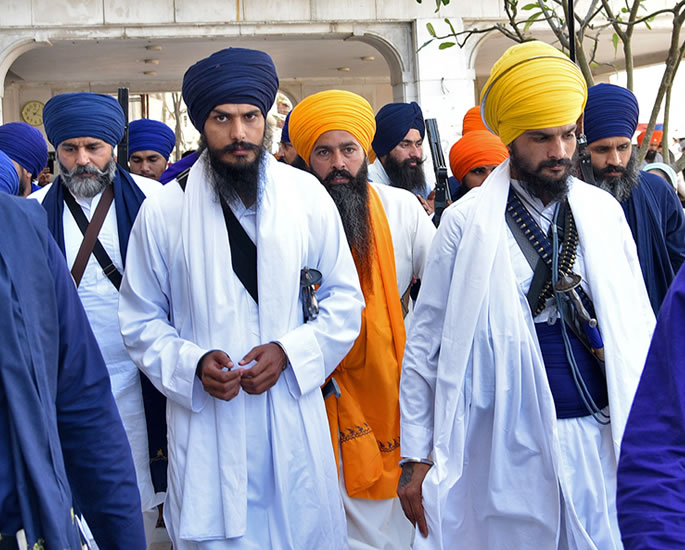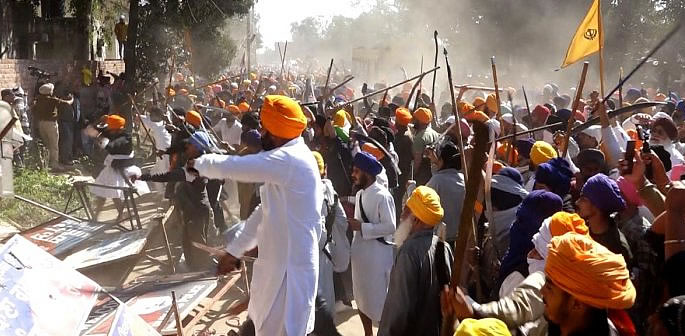Singh's rise in Punjab politics has been rapid.
In India, especially in Punjab, there has been unrest which has the world’s attention.
And this is due to the authorities searching for one man – Amritpal Singh.
Authorities have been searching for him using a variety of methods such as deploying thousands of paramilitary soldiers, a statewide internet blackout and a high-speed chase.
However, it has been to no avail.
This has resulted in tension, with Singh’s supporters clashing with police.
We explore some of the events that have occurred during the unrest in Punjab.
Who is Amritpal Singh?

Amritpal Singh is a self-styled preacher and a Khalistan separatist.
The Khalistan movement is a Sikh separatist movement seeking to create a homeland for Sikhs by establishing a sovereign state.
The movement has sympathisers among the Sikh diaspora, particularly in the UK and Canada, but Indian officials treat it as a threat to national security.
Singh’s rise in Punjab politics has been rapid.
He was based in Dubai, working for his family’s transport business. Then in March 2022, he surprisingly became the leader of Waris Punjab De, a pressure group founded to advocate for farmers’ rights in Punjab.
Singh returned to Punjab in August 2022 and his arrival drove attention on social media.
He dressed like famous Sikh militant Jarnail Singh Bhindranwale, who was killed by government forces inside the Golden Temple in Amritsar in 1984.
His supporters posted the image on Facebook and attention started to grow.
Hartosh Singh Bal, executive editor of The Caravan magazine, said:
“He was clean-shaven until a year ago.
“Suddenly, he comes into Punjab, claims many things, grows his hair, baptises himself, and grows a following.”
“There is a huge amount of construction in this man, who never had support on the ground on any large level.”
Singh has a lot of supporters and it has led to clashes.
Storming a Police Station

In February 2023, Amritpal Singh was booked after an FIR was registered following a complaint by Varinder Singh.
The complaint was filed at Ajnala Police Station against six named people and 20 unidentified people.
The FIR listed kidnapping, theft and voluntarily causing hurt as the offences.
Varinder Singh, who is said to be a former supporter of Amritpal Singh, alleged that he was kidnapped from outside the headquarters by Singh’s supporters and taken to Jallupur Khera village, where the Waris Punjab De chief runs his organisation.
According to Varinder, he knew about the alleged immoral activities of Bikramjit Singh, a close aide of Amritpal Singh.
Varinder claimed Singh and his group were spreading false propaganda and dividing people.
He wanted to discuss the issue with Singh but was not allowed a meeting. He later uploaded a video on Facebook which allegedly upset Amritpal and his men.
This led to tension erupting in Ajnala.
In retaliation to one of his aides being arrested, Amritpal Singh and thousands of his supporters stormed the police station and clashed with officers, resulting in six officers being injured.
It was a while before the authorities started their operation to find him.
Internet Blackout

On the morning of March 18, 2023, a video of Singh was live-streamed on Facebook, showing him sitting in a car speeding through vast farm fields while being chased by the police.
At noon that day, the internet was shut down, leaving 27 million people without internet.
Punjab’s Aam Aadmi Party said the internet shutdown was enforced to reduce the spread of misinformation.
From March 18 to March 21, smartphones in Punjab could only be used to make calls and receive text messages.
The next three days, the shutdown was restricted to six districts, after which it was brought down to two.
Broadband in homes and offices was not disrupted, although most working-class Indians have only mobile access and do not have fixed-line internet installed.
According to Professor Jagrup Sekhon, it was an attempt to limit Singh’s growing notoriety and to stop him from mobilising supporters.
On numerous occasions, the Indian government has enforced internet blackouts as a tool for control.
The government has also increasingly pressured social media companies to restrict access to politically sensitive content and accounts.
Before Elon Musk acquired Twitter, the platform had resisted the Indian government’s orders to take down content.
In July 2022, the company filed a petition in the Karnataka High Court seeking judicial review of the content that the government wanted to be blocked.
But since Musk’s takeover in 2022, the company has largely seemed to comply with orders to block accounts on the request of the Indian government.
Since March 19, at least 120 prominent Twitter accounts have been blocked.
The blocks have continued. On March 28, the account of BBC News Punjabi was withheld from Indian users.
Gagandeep Singh, who runs a YouTube channel called Pro Punjab, said he has not been able to access his Twitter since March 20.
He said: “I had only been tweeting news stories and developments that are already published elsewhere.
“It was really surprising. How can you suppress the voice of journalists that are merely posting verified updates?”
Although the Indian authorities justify their internet restrictions, some believe it could escalate tensions.
By turning the hunt for Singh into a huge, disruptive, statewide event, the government has played into the separatists’ hands, allowing them to spin up a narrative that attacks on him are attacks on Sikhism.
Professor Pramod Kumar, director of the Institute for Development and Communication, Chandigarh, said the internet shutdown in Punjab and targeting of Twitter handles was an “overreaction” because Singh doesn’t have much groundswell in the first place.
He said: “He only managed to energise the radical elements within the diaspora of Punjab.
“But in the state, he doesn’t have much mass support. He landed from somewhere and he wanted to take off. But he couldn’t.”
Hartosh Singh Bal agreed: “It created a perception that there is some huge radical activity going on in Punjab when it is quite contrary to the reality.
“It further feeds into the diaspora’s imagined sense of injustice in the state.
“It is certainly counterproductive unless the government is interested in creating a narrative of Khalistan.”






























































